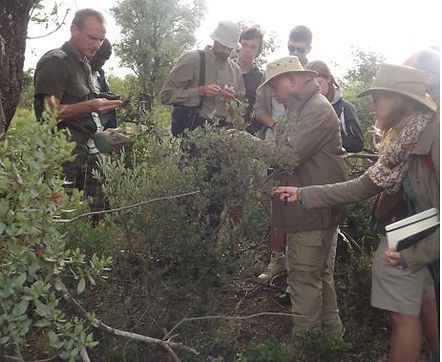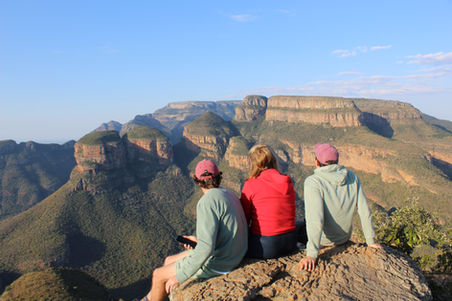
Field Guiding Course
The FGASA Level 1 Field Guide course has been structured to cover a wide array of subjects and specialisms relating to the natural world. This total approach ensures you'll have a complete understanding of nature so you feel at home as you live and work in Southern Africa's remote regions.
You might be experienced with the outdoors and animals already or a total novice. Whatever your background, as you complete the 2 month course you'll gain transferable skills, knowledge and a familiarity of wildlife and the environment like you couldn't imagine.... with a professional accreditation to prove it!
Led by your instructors, the course will be split between theory work (classroom style lesions, studying and exams) as well as intense twice daily practical training to be completed on foot and via 4x4 vehicle.
This course is a great opportunity and supports anyone looking to develop a career in wildlife & conservation, outdoors activities or beginning a life in Southern Africa as a guide!
South Africa is a leader in the conservation and environmental sector. FGASA itself has a long history and is established as an internationally recognized professional standard and what the conservation industry operates to across Southern Africa.
You'll learn from the best: The transferable skills, practical experience and theoretical and scientific knowledge you'll gain can be directly applied if you choose to work as a guide or in any role working with wildlife, animals, conservation, ecology, the environment or the outdoors!
What the course covers
During your 2 Month course, via practical training and theoretical studying you'll develop skills from tracking animals like elephant on foot, understanding animal's migration habits to taxonomical classification.
We've broken down the main modules of the course so you can know what to expect.
Dangerous Game Approach
Lead by your instructors, you'll learn how to approach dangerous wildlife such as buffalo and rhino both on foot and in a vehicle.
Build your confidence, stay observant and learn how to approach with the animal's escape routes in mind. Understand how to control the situation for your and the animal's safety... an awe inspiring experience!

What will you be doing?
-
Learn how to approach wildlife
-
Observe animal behaviour up close
-
Build your confidence
-
Learn how to stalk quietly
-
Monitor wildlife health and check for illness
Track and Sign
The art of tracking is as old as mankind walking upright. Unlock your innate skill as you learn how to track and look for signs of wildlife like droppings, scrapes or territorial marking plus understand how to read and interperete it.
You'll gain a qualification in tracking upon passing the Cyber Tracker, Track and Sign Exam!
What will you be doing?
-
Understand how to track wildlife
-
Interpret track and sign to determine movement and behaviour of wildlife
-
Gain a qualification showing your competency
Bird identification
Learn to identify the hundreds of species of bird native to the reserve, from iconic vultures and eagles to smaller species like nightjars or oxpeckers.
Gain another unique and accredited qualification!
Learn how to distinguish between visually through their characteristics as well as by song and call.
What will you be doing?
-
Learn to identify species
-
Understand their behaviour
- Learn about their role in the ecosystem
-
Learn to ID via call and sight
-
Gain an additional qualification

Habitat and reserve management
Understand what goes into running and maintaining a working reserve. From combating soil erosion, managing fire risks, repairing fences, to removing invasive plant species and introducing new ones.
What will you be doing?
-
Understand encroaching species of plant
-
Clearing fire breaks
-
Combating soil erosion
-
Reserve maintenance on fences or roads


Natural Sciences
The natural world is interconnected at every level, the weather and soil and rock type determine the ecosystem and thus which animals call it home.
A guide should have an appreciation and understanding of all of it so included in the course are modules to give that complete knowledge.
What will you learn?
-
Geology
-
Astronomy
-
Ecology
-
Mammalian Biology
-
Meteorology
-
Taxonomy

Animal Behaviour
Your instructors will help you get into the minds of the animals you'll be living and working with.
Each species has its own habits dependant on its evolution and in response to the environment. Understanding this is essential as a guide, helping you locate wildlife and how to interact with it.
What will you be doing?
-
Understand species related behaviour
-
Learn to read tells and warning signs
-
Insight into the lives of animals
-
Study behaviour of mammals, reptiles and birds
Mammal Identification
South Africa is home to some of the most incredible mammal species on the planet. From iconic species like elephants or lions to the more unknown like the waterbuck, dwarf mongoose or pangolin.
You'll learn to identify all of these and be fortunate to see a lot of them as you explore the reserve!
What will you be doing?
-
Learn characteristics of each species and genus
-
Learn to identify Southern Africa's mammals
-
Solidify your knowledge through first hand sightings

Animal Sounds and Interpretation
Over distances animals rely on a diverse array of vocalisations, calls and noises.
Being able to distinguish this can help you know which animals are around you and doing what.
Maybe a monkey giving a leopard alarm call? Or a seldom seen bird species?
What will you learn?
-
Identification of calls and sounds
-
Distinguish uses of calls by animals
-
Uses of mimic sounds

Reptile Identification
Lizards, geckos, skinks, snakes, chameleons, turtles and more all call your reserve home. Some so common you'll see them everyday, others so well camouflaged you'll be lucky too see them at all!
Enjoy learning about and how to identify them
What will you learn?
-
Learn about different species
-
Distinguish between venomous and non-venomous snake species
-
Understand their life cycle
-
Get familiar with tracking them!

Insect Identification
Insects are the backbone of most ecosystems: termites help indigestible grasses get turned back to nutrition for the soil and dung beetles help keep the savannah clean.
You'll understand these often overlooked creatures and their lives.
What will you learn?
-
Understand the roles of insects
-
Learn about traditional uses with them
-
Learn about potentially dangerous species
-
Be able to identify key species

Anthropology and human history
You'll touch on the origins of man in Southern Africa (who cave paintings can be found throughout South Africa and who's stone axe heads can still be found on the reserve!)
Plus the more recent ways people have operated in the area and how we've restored degraded environments to wildlife havens.
What will you learn?
-
Early history of man in Africa
-
Traditional Cultures in Southern Africa
-
Southern African Archaeology

Plant and Grass Indentification
Learn about plants and grasses, which species rely on them, their classifications and distributions.
Plants directly determine which species can survive in an area so this is essential knowledge for a guide.
You'll also learn about some traditional uses, edibility and even medicinal properties.
What will you learn?
-
Plant and grass identification
-
Traditional uses
-
Classifications and distributions
-
Life cycles and ecological status



























